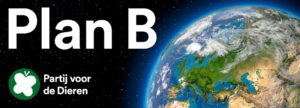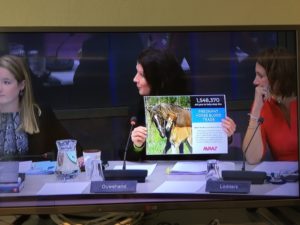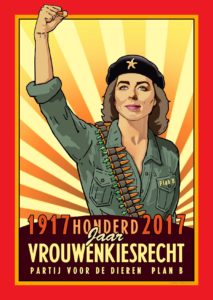Worldlog 23 ianuarie 2017
Nu mai este mult până vom putea vota din nou în Țările de Jos. În data de 15 martie vor avea loc alegeri parlamentare. Partidul pentru Animale participă, bineînțeles, din nou la acestea! În următoarele săptămâni vom face din plin campanie electorală pentru a familiariza cetățenii cu programa noastră electorală, intitulată „Planul B”, deoarece nu există nici o planetă B.
Eu am încă o dată onoarea de a fi lider de campanie pentru Partidul pentru Animale. În perioada următoare veți citi multe în worldlog despre campania noastră și despre toate activitățile pe care le vom desfășura. Pentru moment, puteți citi deja introducerea programei noastre electorale „Planul B” aici. Întregul program electoral este tradus de asemenea și în limba engleză și se poate citi aici.

Grație unei petiții, care a fost distribuită enorm de mult, s-a făcut săptămâna trecută tărăboi cu privire la Gonadotrofina Serică de Iapă Gestantă (PMSG). PMSG este un hormon din sângele iepelor gestante, utilizat printre altele în industria zootehnică din Țările de Jos și Germania pentru a spori fertilitatea animalelor. Pentru a obține hormonul sunt recoltate în condiții teribile cantități mari de sânge de la iepele gestante.
Grupul nostru european a pus deja de nenumărate ori în discuție această chestiune, fapt ce se poate vedea aici și aici. Ca urmare a întrebărilor parlamentare din partea Partidului pentru Animale, Guvernul neerlandez se va mobiliza de asemenea pentru impunerea unei interdicții!

În doar o săptămână, petiția pentru interzicerea PMSG a fost semnată de mai mult de 1,5 milioane de cetățeni europeni.
Exact acum un secol, femeile din Țările de Jos au primit drept de vot. În onoarea acestei aniversări, artistul Joost Veerkamp mi-a făcut portretul de mai jos.

Acum, o sută de ani mai târziu, emanciparea femeii încă nu s-a finalizat. De exemplu, veniturile femeilor și bărbaților încă nu sunt la fel, chiar și în cazul aceluiași nivel de educație sau acelorași abilități. În multe sectoare economice predomină încă ideea preconcepută că pentru femei (și pentru bărbați) combinarea muncii cu îngrijirea familiei este dificilă.
Spre exemplu în politică. În Țările de Jos, numărul femeilor în Parlament este în continuare mai puțin de jumătate. Dintre cei 17 președinți de partide parlamentare, eu sunt singura femeie lider de partid. Politica pare a fi o activitate pentru bărbați, în care femeile sunt bineînțeles tolerate, dar joacă rol de subordonat.
Eu personal m-am lăsat întotdeauna inspirată de ‘politica expresivă’ ale primelor mișcări de emancipare: dezvăluirea abuzurilor, influențarea semnificativă a punctelor de vedere principiale și a agendei politice. Când noi cu Partidul pentru Animale am intrat în Parlament, bunăstarea animalelor era un subiect irelevant, în prezent este o preocupare comună la scară largă. Îmi doresc mai multe femei în Parlament!
Vă salut călduros,
Marianne
It will not be long before elections will take place again in the Netherlands. The national elections for the Lower House of Parliament will be held on 15 March. The Party for the Animals will of course participate as well! We will actively campaign the next few weeks to introduce to everyone our election programme ‘Plan B’ because there is no Planet B.
I am honoured to be the leading candidate for the Party for the Animals again. The coming weeks you will read much about our campaign and all actions that we will carry out, in my Worldlog. The introduction to our election programme Plan B has been translated in all twelve languages of this website. Click here and change of language at “Languages”. The full programme has also been translated into English and can be read here.

Thanks to a petition that was greatly shared, commotion was caused last week about the Pregnant Mare Serum Gonadotropin (PMSG). PMSG is a hormone made of the blood of pregnant mares that is used in the Dutch and German livestock industry among other countries to improve the reproduction of animals. To produce the hormone large volumes of blood are extracted from pregnant mares under severe conditions.
Our European group already raised this subject a few times, see here and here. Following Parliamentary Questions raised by the Party for the Animals, the Dutch government will start to work actively on the banning of PMSG.

In only one week’s time, the petition to ban PMSG was signed by over 1.5 million European citizens.
Exactly one hundred year ago, the women in the Netherlands were given the right to vote. In celebration of this anniversary, the artist Joost Veerkamp made the following portrait of me.

Now, one hundred years later, women’s emancipation has not finished yet. For example, the incomes of women and men are still not equal, not even if they have the same education and capacities. In many branches of industry, there is a work ethic that makes it difficult for women (en men) to combine work and care.
Take politics for instance. In the Netherlands, the number of women in the Lower House is still less than half. Out of 17 party chairmen I am the only female leading candidate. Politics seems to be for men only, where women are tolerated but play a minor role.
Personally, I have always been very inspired by the expressive politics of the first emancipation movements: expose abuses, adopt basic positions, and to have a great impact on the political agenda. Animal welfare was irrelevant at the time that we, with the Party for the Animals, entered the Lower House, but these days it is a broadly shared concern. I hope that many new women will join the Lower House!
Kind regards,
Marianne